Education4ocean - help us build a school in Indonesia
Join us on our mission to create a better educational environment for the kids in Lombok, Indonesia! We are helping our Indonesian friend, who teaches local children in her own home, fulfil her dream and create a place to teach these kids English.
Author: BeSea protect ocean
Choose reward for your contribution
-
sold 4Good (wo)man - donation for building the schoolYou can give us money for building the school just because you like the idea of our project Education4ocean.
And if you don’t need a gift and still give us a more considerable donation, you can increase the amount.
Reward delivery: in a week after the Hithit project end
EUR 3.96(CZK 100) -
sold 2Cook our favourite Lombok recipeContribute to snacks for school students.
We will send you an email with one special Lombok recipe as a gift. Your donation helps us with building the school.
Reward delivery: in a month after the Hithit project end
EUR 5.94(CZK 150) -
remaining 44 from 50Video greeting from the childrenDo you want to move to a local village in Indonesia just for a while?
We will show you how does the village look like, send you a greeting video from the local children who will attend the school. Video greeting video will be sent to your e-mail.
Reward delivery: in half a year after the Hithit project end
EUR 7.91(CZK 200) -
remaining 150 from 150Lecture about LombokVisit our lecture and listen to the stories from our Lombok travels! We will also share what specific plans we have with the school in the local village.
Talks will take place in several locations all over the Czech Republic, eventually also online.Reward delivery: in half a year after the Hithit project end
EUR 9.89(CZK 250) -
remaining 16 from 20Traditional Lombok recipesDo you want to taste traditional Lombok recipes at your home? So this is a reward just for you! You will receive the TOP 10 best recipes from local mothers, aunts, and grandmothers in this reward. Your contribution will support the school building construction. We will send recipes in electronic form.
Reward delivery: on address, in half a year after the Hithit project end
EUR 13.85(CZK 350) -
remaining 23 from 30Hand-painted picture from local childrenWe will bring you a hand-painted picture of the children of the village who will attend the school. We will send you this picture directly to your home. Indeed we will frame it. The price includes postage in the Czech Republic, not abroad. The fee for postage abroad is paid extra. Or we can send it to you online.
Reward delivery: on address, in half a year after the Hithit project end
EUR 15.04(CZK 380) -
remaining 9 from 10Relax set from Lombok in your homeDo you want to add a couple of products from Lombok to your bathroom? In this relax set, you will find a face mask, a soap and a toothbrush.
We will send the reward up to your home. The price includes postage in the Czech Republic, not abroad. The fee for postage abroad is paid extra. By purchasing this gift, you have supported school construction.
Reward delivery: on address, in half a year after the Hithit project end
EUR 16.62(CZK 420) -
remaining 28 from 30A Christmas gift - voucherAre you not sure about choosing a Christmas gift for someone close to you? You can present a trifle that might serve as a good cause at the same time. After donating money, you will receive an e-mail voucher stating a dedication either directly to you or someone you wish it to give to, along with an explanation of how specifically the money in the project will be applied. On top of that, you will also receive sharks brochures in electronic form.
Reward delivery: in a month after the Hithit project end
EUR 19.79(CZK 500) -
remaining 5 from 10A shark hatDo you want a hat for winter which will warm your head and heart? By purchasing this gift, you have supported the school’s furniture purchase.
The cap has a hand-sewn shark tag made of eco-leather (a leather imitation, the whole product is cruelty-free) and sewn in the Czech Republic.
You can choose between 3 colours – black, dark blue and mustard. We will send the cap up to your home. The price includes postage in the Czech Republic, not abroad. The fee for postage abroad is paid extra.Your contribution supports school construction.Reward delivery: on address, in a month after the Hithit project end
EUR 19.79(CZK 500) -
remaining 27 from 30School supplies for studentsWith this contribution, you will supply school supplies to students, which will help them study. They will receive a set of student books (English language, ecology) upcycle pencil case and a notebook with a pen.
As a gift, we will send this set to you too! The price includes postage in the Czech Republic, not abroad. The fee for postage abroad is paid extra.
Reward delivery: on address, in half a year after the Hithit project end
EUR 23.74(CZK 600) -
remaining 28 from 30Everlasting supporter – your name will be written down on the school wallYour name will be written on one of the school walls forever. A picture from the school will be surely sent to your e-mail.
Reward delivery: in over a year after the Hithit project end
EUR 27.70(CZK 700) -
remaining 16 from 20A chair to a classroomContribute a chair to the classroom so that the kids don’t sit on the floor.
And a gift for you? We will send you an electronic version of our schoolbook
addressed to Lombok´s nature conservation.Reward delivery: on address, in half a year after the Hithit project end
EUR 31.66(CZK 800) -
remaining 29 from 30A salary for a teacherYour contribution ensures a part of the salary for local teachers.
As a gift, we will send you a greeting video from the kids and an ecological schoolbook that will serve as studying material for the kids.Reward delivery: on address, in half a year after the Hithit project end
EUR 59.36(CZK 1,500) -
remaining 9 from 10A freediving courseAre you in love with the ocean, and do you want to master your skill in how to hold up your breath underwater for a longer period? So this is a reward just for you! Our friend Honza will teach you how to hold your breath underwater for more than 2 minutes within one training session. You just want this!
How and where the course will take place?
This course takes roughly 5 hours. For the first 2 hours, you will be on dry land. You will teach essential theory, relaxation, breath retention, pressure balance, security rules and principles. For the following 3 hours, you will be diving in the deepest pool in the Czech Republic – Aqua palace in Čestlice.
And here you can take a look at Honza's work and what awaits you:
https://www.facebook.com/freedivepraha/
We will send you other necessary information by e-mail. Your contribution will support the construction of the school.Reward delivery: in a month after the Hithit project end
EUR 79.15(CZK 2,000) -
remaining 3 from 4A good geed memory tattooDo you want to get a tattoo by combining this project with your lifetime memory? We have some tattoo vouchers for you - Tattoos by Anička, who tattoos in Brno, Prague and Jaroměř. The price for one coupon is 2500 CZK.
We will send a voucher to your e-mail. By purchasing this gift, you have supported school construction.Reward delivery: in a month after the Hithit project end
EUR 98.93(CZK 2,500) -
remaining 9 from 10School desks for two studentsYou are contributing school desks for students by purchasing this gift.
We will send you our school book in online form addressed to Lombok´s nature conservation as a gift.Reward delivery: in half a year after the Hithit project end
EUR 118.72(CZK 3,000) -
remaining 1 from 1Blackboard to the classroomBuy us a blackboard in the classroom to make us work well.
You will be gifted with our printed schoolbook addressed to Lombok´s nature conservation, and additionally, we will write your name on the wall next to the blackboard.Reward delivery: in half a year after the Hithit project end
EUR 237.44(CZK 6,000) -
remaining 1 from 1A deep-sea paintingThe abstract painting is named HLUBINA. Everyone can interpret part of the image in their way. The author´s effort was to eternise those fascinating blue shades of Jadran, which she observed as a diver on several occasions. Golden smudges add a mystery to the painting. Everyone can interpret them in their way. What do they remind you? Someone finds it as glitter on the surface inside the morning sun rays, others as a glittery shoal of tiny fish. But maybe it might be just reflections of plastic bottles. This picture hides secrets just as the deep sea itself.
Author : Anna Milerová
Size : 80x10 cbm
Material: canvas + akryl
The price includes postage in the Czech Republic, not abroad. The fee for postage abroad is paid extra. Your contribution will support school building construction.Reward delivery: on address, in a month after the Hithit project end
EUR 316.58(CZK 8,000) -
remaining 1 from 1Oil painting Boat and sailboatThe painting is embodied in an actual script from the author's life.
The painting has its roots in Italy, where the author, at the morning walk, noticed the fishermen who sailed their old boat to the sea. A sailboat sailed behind them.
This scenery inspired the author so much that he intended to immortalise her. He made several sketches on the spot and then worked on the canvas.
At first glance, these two others make a beautiful contrast to the image.
Size: 50x90 cm
Frame: Lightwood - spruce, thickness 5.5 cm
About the author
The price includes postage in the Czech Republic, not abroad. The fee for postage abroad is paid extra.Reward delivery: on address, in a month after the Hithit project end
EUR 593.59(CZK 15,000) -
remaining 3 from 3Fly with usWould you like to go with us to teach children in Tanjun Luar?
The price includes accommodation per month, our Be Sea mission t-shirt, an ecology textbook to teach local children, a brochure about Lombok to better prepare you for the trip. At the same time, half a year before the trip, we will meet together several times (in person or online) to prepare for a joint journey together. The price does not include air tickets and food.Reward delivery: on address, in over a year after the Hithit project end
EUR 791.45(CZK 20,000) -
remaining 1 from 1Bronze statue called SEAImpressive bronze statue of the Sea by academic sculptor Petr Novák. The sculpture was created by long-term studies of the sea and women when the author combined these two seemingly different themes into an impressive work. Petr Novák is a classical sculptor who creates realistic bronze, stone, and wood sculptures. In his freelance work, he deals with the themes of horses, seas and women (it is essential to follow this order). He has been working on the ocean theme for over 30 years. By purchasing, you supported the construction of the school.
Reward delivery: on address, in a quarter after the Hithit project end
EUR 3,957.26(CZK 100,000) -
Sold out!!Free ticket to Zoo LiberecDo you want to see the animals that live in Indonesia? Go ahead and visit Liberec zoo. Perhaps some people do not find zoos a nature conservation symbol but trust us; it is not like that. Czech zoological gardens are considered one of the best in the world. They provide ecology education for visitors directly in the area. They have their conservation projects and support domestic and foreign non-profitable projects. Unfortunately, nowadays, zoos are considered as a sanctuary for animal species whose natural habitat is disappearing from the world.
Freebies that are applicable upon zoo entry will be sent into your e-mail box. By purchasing this gift, you have supported school construction.Reward delivery: in a month after the Hithit project end
EUR 7.91(CZK 200) -
Sold out!!A freebie to the Zoo with a unique programWe have some special tickets for you to the Zoo Liberec. With your ticket, you will be able to look into places that other visitors are not allowed to. Mr Pavel Zoubek, one of the best Czech conservationists, will guide you throughout the zoo. And be sure that this tour will be worth it.
A Zoo tour voucher will be sent by e-mail. By purchasing this gift, you have supported school construction.Reward delivery: in a month after the Hithit project end
EUR 39.57(CZK 1,000)
How will the funds be used?
We aim to secure a sufficient study environment for Indonesian children - to repair the building, equip the classroom with furniture, provide necessary study materials, and create a sanitary environment where the children could meet up and study regularly. We will help build a better relationship between local children and the nature surrounding them, teach them to protect their environment and help them understand sustainable fishing and careful waste disposal. Because we believe it is up to them - the future generation.
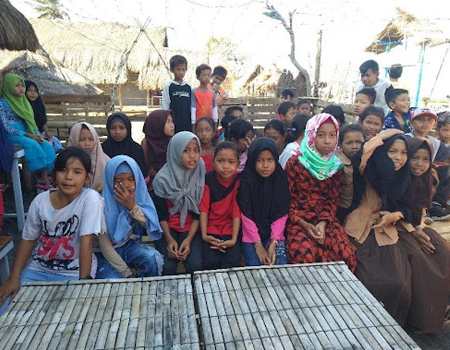
Photo: Lecture about plastic pollution
Photo: The last day of school with the children we taught every day about ecology and English
How was the crowdfunding campaign on Hithit started?
The first time we visited Tanjung Luar village in Lombok was four years ago. We travelled there to map the shark market, where shark finning is a regular practice. Fins are then transported to Asia, mainly to China, where it is made into a shark fin soup - a local delicacy. We also educated children and local people about ecology, sustainable fishing and waste disposal management.
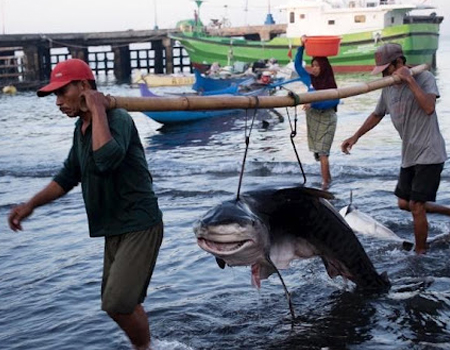
Photo: Caught shark on bamboo poles,… More
Project links
Choose reward for your contribution
-
sold 4Good (wo)man - donation for building the schoolYou can give us money for building the school just because you like the idea of our project Education4ocean.
And if you don’t need a gift and still give us a more considerable donation, you can increase the amount.
Reward delivery: in a week after the Hithit project end
EUR 3.96(CZK 100) -
sold 2Cook our favourite Lombok recipeContribute to snacks for school students.
We will send you an email with one special Lombok recipe as a gift. Your donation helps us with building the school.
Reward delivery: in a month after the Hithit project end
EUR 5.94(CZK 150) -
remaining 44 from 50Video greeting from the childrenDo you want to move to a local village in Indonesia just for a while?
We will show you how does the village look like, send you a greeting video from the local children who will attend the school. Video greeting video will be sent to your e-mail.
Reward delivery: in half a year after the Hithit project end
EUR 7.91(CZK 200) -
remaining 150 from 150Lecture about LombokVisit our lecture and listen to the stories from our Lombok travels! We will also share what specific plans we have with the school in the local village.
Talks will take place in several locations all over the Czech Republic, eventually also online.Reward delivery: in half a year after the Hithit project end
EUR 9.89(CZK 250) -
remaining 16 from 20Traditional Lombok recipesDo you want to taste traditional Lombok recipes at your home? So this is a reward just for you! You will receive the TOP 10 best recipes from local mothers, aunts, and grandmothers in this reward. Your contribution will support the school building construction. We will send recipes in electronic form.
Reward delivery: on address, in half a year after the Hithit project end
EUR 13.85(CZK 350) -
remaining 23 from 30Hand-painted picture from local childrenWe will bring you a hand-painted picture of the children of the village who will attend the school. We will send you this picture directly to your home. Indeed we will frame it. The price includes postage in the Czech Republic, not abroad. The fee for postage abroad is paid extra. Or we can send it to you online.
Reward delivery: on address, in half a year after the Hithit project end
EUR 15.04(CZK 380) -
remaining 9 from 10Relax set from Lombok in your homeDo you want to add a couple of products from Lombok to your bathroom? In this relax set, you will find a face mask, a soap and a toothbrush.
We will send the reward up to your home. The price includes postage in the Czech Republic, not abroad. The fee for postage abroad is paid extra. By purchasing this gift, you have supported school construction.
Reward delivery: on address, in half a year after the Hithit project end
EUR 16.62(CZK 420) -
remaining 28 from 30A Christmas gift - voucherAre you not sure about choosing a Christmas gift for someone close to you? You can present a trifle that might serve as a good cause at the same time. After donating money, you will receive an e-mail voucher stating a dedication either directly to you or someone you wish it to give to, along with an explanation of how specifically the money in the project will be applied. On top of that, you will also receive sharks brochures in electronic form.
Reward delivery: in a month after the Hithit project end
EUR 19.79(CZK 500) -
remaining 5 from 10A shark hatDo you want a hat for winter which will warm your head and heart? By purchasing this gift, you have supported the school’s furniture purchase.
The cap has a hand-sewn shark tag made of eco-leather (a leather imitation, the whole product is cruelty-free) and sewn in the Czech Republic.
You can choose between 3 colours – black, dark blue and mustard. We will send the cap up to your home. The price includes postage in the Czech Republic, not abroad. The fee for postage abroad is paid extra.Your contribution supports school construction.Reward delivery: on address, in a month after the Hithit project end
EUR 19.79(CZK 500) -
remaining 27 from 30School supplies for studentsWith this contribution, you will supply school supplies to students, which will help them study. They will receive a set of student books (English language, ecology) upcycle pencil case and a notebook with a pen.
As a gift, we will send this set to you too! The price includes postage in the Czech Republic, not abroad. The fee for postage abroad is paid extra.
Reward delivery: on address, in half a year after the Hithit project end
EUR 23.74(CZK 600) -
remaining 28 from 30Everlasting supporter – your name will be written down on the school wallYour name will be written on one of the school walls forever. A picture from the school will be surely sent to your e-mail.
Reward delivery: in over a year after the Hithit project end
EUR 27.70(CZK 700) -
remaining 16 from 20A chair to a classroomContribute a chair to the classroom so that the kids don’t sit on the floor.
And a gift for you? We will send you an electronic version of our schoolbook
addressed to Lombok´s nature conservation.Reward delivery: on address, in half a year after the Hithit project end
EUR 31.66(CZK 800) -
remaining 29 from 30A salary for a teacherYour contribution ensures a part of the salary for local teachers.
As a gift, we will send you a greeting video from the kids and an ecological schoolbook that will serve as studying material for the kids.Reward delivery: on address, in half a year after the Hithit project end
EUR 59.36(CZK 1,500) -
remaining 9 from 10A freediving courseAre you in love with the ocean, and do you want to master your skill in how to hold up your breath underwater for a longer period? So this is a reward just for you! Our friend Honza will teach you how to hold your breath underwater for more than 2 minutes within one training session. You just want this!
How and where the course will take place?
This course takes roughly 5 hours. For the first 2 hours, you will be on dry land. You will teach essential theory, relaxation, breath retention, pressure balance, security rules and principles. For the following 3 hours, you will be diving in the deepest pool in the Czech Republic – Aqua palace in Čestlice.
And here you can take a look at Honza's work and what awaits you:
https://www.facebook.com/freedivepraha/
We will send you other necessary information by e-mail. Your contribution will support the construction of the school.Reward delivery: in a month after the Hithit project end
EUR 79.15(CZK 2,000) -
remaining 3 from 4A good geed memory tattooDo you want to get a tattoo by combining this project with your lifetime memory? We have some tattoo vouchers for you - Tattoos by Anička, who tattoos in Brno, Prague and Jaroměř. The price for one coupon is 2500 CZK.
We will send a voucher to your e-mail. By purchasing this gift, you have supported school construction.Reward delivery: in a month after the Hithit project end
EUR 98.93(CZK 2,500) -
remaining 9 from 10School desks for two studentsYou are contributing school desks for students by purchasing this gift.
We will send you our school book in online form addressed to Lombok´s nature conservation as a gift.Reward delivery: in half a year after the Hithit project end
EUR 118.72(CZK 3,000) -
remaining 1 from 1Blackboard to the classroomBuy us a blackboard in the classroom to make us work well.
You will be gifted with our printed schoolbook addressed to Lombok´s nature conservation, and additionally, we will write your name on the wall next to the blackboard.Reward delivery: in half a year after the Hithit project end
EUR 237.44(CZK 6,000) -
remaining 1 from 1A deep-sea paintingThe abstract painting is named HLUBINA. Everyone can interpret part of the image in their way. The author´s effort was to eternise those fascinating blue shades of Jadran, which she observed as a diver on several occasions. Golden smudges add a mystery to the painting. Everyone can interpret them in their way. What do they remind you? Someone finds it as glitter on the surface inside the morning sun rays, others as a glittery shoal of tiny fish. But maybe it might be just reflections of plastic bottles. This picture hides secrets just as the deep sea itself.
Author : Anna Milerová
Size : 80x10 cbm
Material: canvas + akryl
The price includes postage in the Czech Republic, not abroad. The fee for postage abroad is paid extra. Your contribution will support school building construction.Reward delivery: on address, in a month after the Hithit project end
EUR 316.58(CZK 8,000) -
remaining 1 from 1Oil painting Boat and sailboatThe painting is embodied in an actual script from the author's life.
The painting has its roots in Italy, where the author, at the morning walk, noticed the fishermen who sailed their old boat to the sea. A sailboat sailed behind them.
This scenery inspired the author so much that he intended to immortalise her. He made several sketches on the spot and then worked on the canvas.
At first glance, these two others make a beautiful contrast to the image.
Size: 50x90 cm
Frame: Lightwood - spruce, thickness 5.5 cm
About the author
The price includes postage in the Czech Republic, not abroad. The fee for postage abroad is paid extra.Reward delivery: on address, in a month after the Hithit project end
EUR 593.59(CZK 15,000) -
remaining 3 from 3Fly with usWould you like to go with us to teach children in Tanjun Luar?
The price includes accommodation per month, our Be Sea mission t-shirt, an ecology textbook to teach local children, a brochure about Lombok to better prepare you for the trip. At the same time, half a year before the trip, we will meet together several times (in person or online) to prepare for a joint journey together. The price does not include air tickets and food.Reward delivery: on address, in over a year after the Hithit project end
EUR 791.45(CZK 20,000) -
remaining 1 from 1Bronze statue called SEAImpressive bronze statue of the Sea by academic sculptor Petr Novák. The sculpture was created by long-term studies of the sea and women when the author combined these two seemingly different themes into an impressive work. Petr Novák is a classical sculptor who creates realistic bronze, stone, and wood sculptures. In his freelance work, he deals with the themes of horses, seas and women (it is essential to follow this order). He has been working on the ocean theme for over 30 years. By purchasing, you supported the construction of the school.
Reward delivery: on address, in a quarter after the Hithit project end
EUR 3,957.26(CZK 100,000) -
Sold out!!Free ticket to Zoo LiberecDo you want to see the animals that live in Indonesia? Go ahead and visit Liberec zoo. Perhaps some people do not find zoos a nature conservation symbol but trust us; it is not like that. Czech zoological gardens are considered one of the best in the world. They provide ecology education for visitors directly in the area. They have their conservation projects and support domestic and foreign non-profitable projects. Unfortunately, nowadays, zoos are considered as a sanctuary for animal species whose natural habitat is disappearing from the world.
Freebies that are applicable upon zoo entry will be sent into your e-mail box. By purchasing this gift, you have supported school construction.Reward delivery: in a month after the Hithit project end
EUR 7.91(CZK 200) -
Sold out!!A freebie to the Zoo with a unique programWe have some special tickets for you to the Zoo Liberec. With your ticket, you will be able to look into places that other visitors are not allowed to. Mr Pavel Zoubek, one of the best Czech conservationists, will guide you throughout the zoo. And be sure that this tour will be worth it.
A Zoo tour voucher will be sent by e-mail. By purchasing this gift, you have supported school construction.Reward delivery: in a month after the Hithit project end
EUR 39.57(CZK 1,000)




















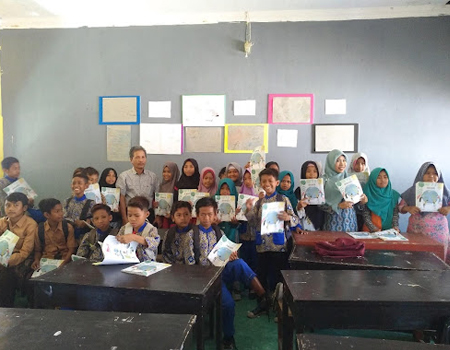
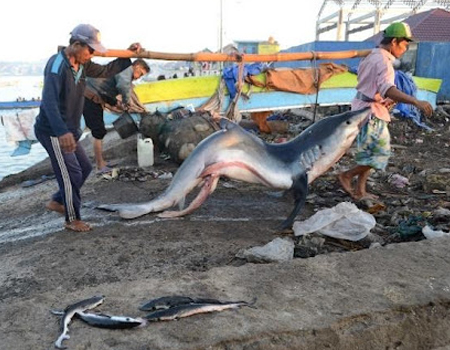
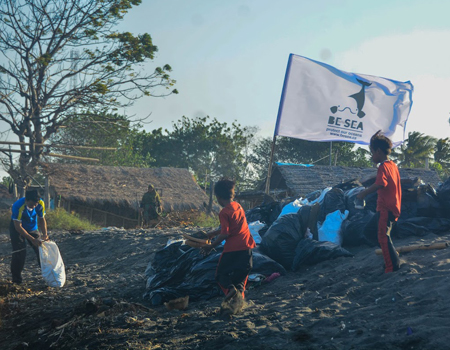
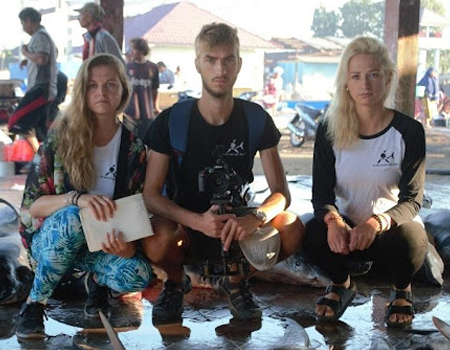
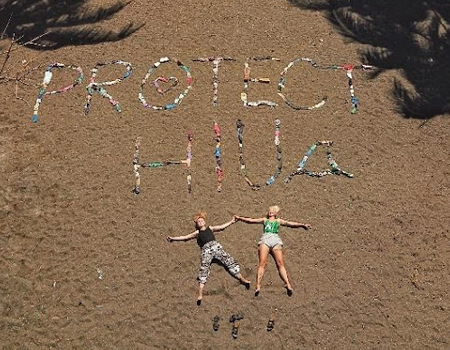
Comments